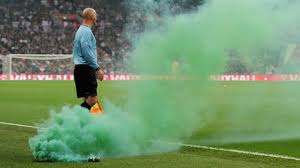By Andrew Warshaw
December 3 – English football is clamping down on the use of flares and smoke bombs, widely used by supporters across much of Europe but, until recently, all but absent from the English game. According to new statistics, in the first three months of this season alone, there were 96 pyrotechnic incidents across the Premier League, Football League, non-league games and domestic cup competitions – compared to just eight throughout the entire campaign in 2010-11.
Poster warnings will now run through club programmes, websites and on advertising boards after a Premier League poll revealed that 87% of fans believe that flares and smoke bombs are dangerous, and that 86% were concerned for their safety.
“Flares are used for marine distress and are designed not to be extinguished easily or quickly,” said the Premier League in a statement. “They contain chemicals and burn at temperatures of 1600C, the melting point of steel. Smoke bombs are mainly used recreationally in paintballing and war games, but these also burn at high temperatures and are designed to be used in wide open spaces.
“They are dangerous for those with asthma or breathing difficulties and can cause panic in a tightly packed crowd. They are not designed for use in confined spaces and it is illegal to enter a football stadium with one and set it off.”
Last season, an eight-year-old was spotted bringing pyrotechnics into one Premier League match. “The child came into the ground with pyrotechnics in his rucksack and was seen passing them to members of an adult group who let them off inside the ground,” said the Premier League.
“It’s the biggest concern we’ve got among fans at the moment,” Cathy Long, head of supporter services at the Premier League, told the BBC. “There have been incidents across the world where people have had bad injuries or died. We’ve been lucky that our leagues haven’t had such major issues yet, but we want to stop that from happening.”
Contact the writer of this story at moc.l1745781139labto1745781139ofdlr1745781139owedi1745781139sni@w1745781139ahsra1745781139w.wer1745781139dna1745781139

